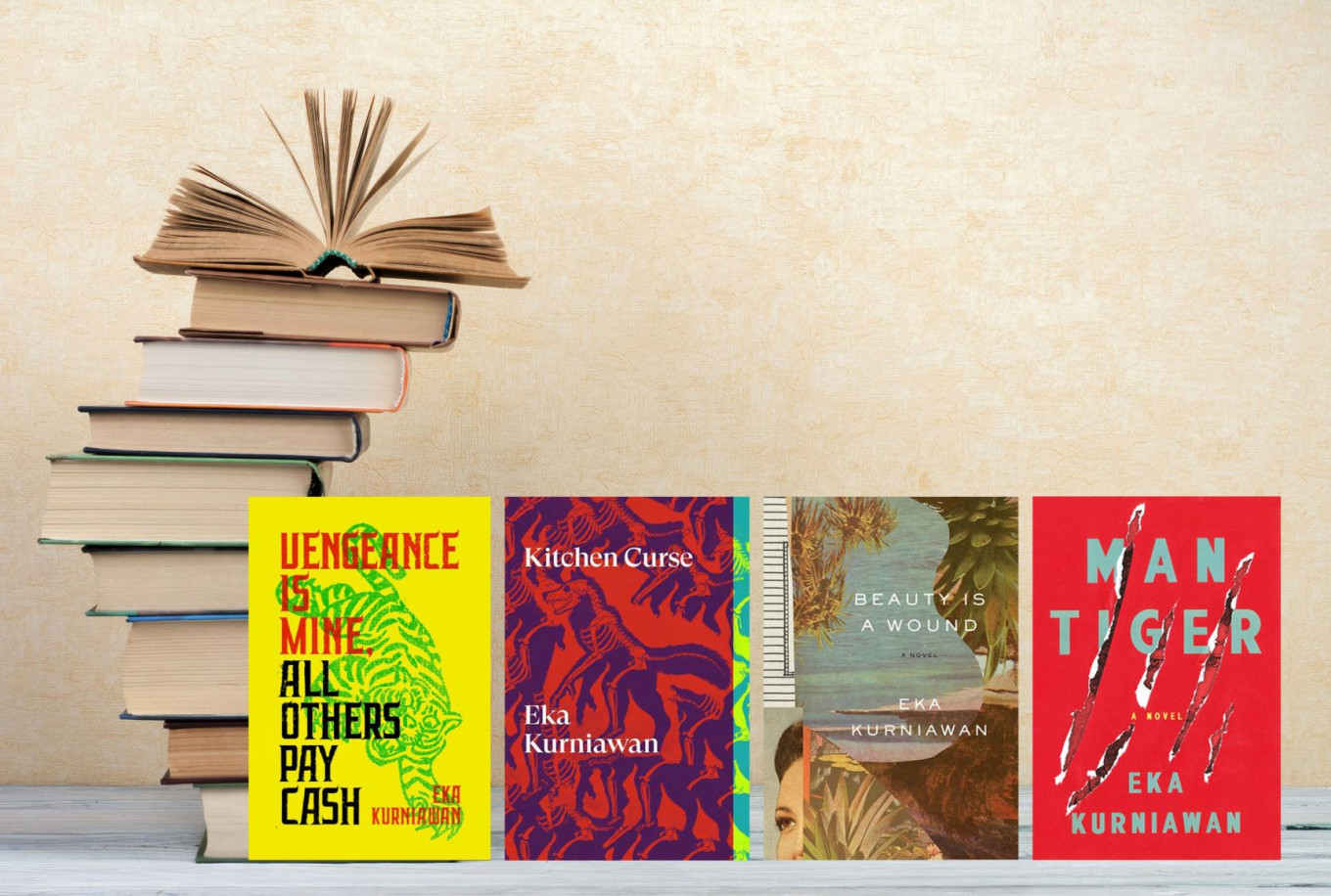Eka Kurniawan: A modest literary star
In person, Indonesian literary writer Eka Kurniawan is soft-spoken, calm and modest. But in his writings, he is fierce and bold.
Change Size
 Beyond borders: Eka Kurniawan’s books have been translated into 35 languages. (Courtesy of goodreads.com/-)
Beyond borders: Eka Kurniawan’s books have been translated into 35 languages. (Courtesy of goodreads.com/-)
It is fair to say that Indonesian author Eka Kurniawan is a modest literary star.
He has gained more public attention since the English version of his novel Lelaki Harimau (Man Tiger) was longlisted for the 2016 Man Booker Prize. In 2019, he won the Prince Claus Award in the literary category. His works have been translated into 35 languages.
When interviewed virtually on the sidelines of KEMBALI 2020: A Rebuild Bali Festival, Eka talked in simple words, conveying his ideas in a very soft-spoken and relaxed manner, while peppering his answers with playful jokes here and there.
And he shared good news. “I started a new novel four years ago, in 2016. I haven’t finished it yet. I still have to rewrite some parts of it. I’d rather not tell you what I’m writing about, because if I do, then this novel will become a myth only and it will never be finalized,” Eka told The Jakarta Post.
The festival, held online from Oct. 29 to Nov. 8, was created by Mudra Swari Saraswati Foundation, which could not deliver its annual Ubud Writers and Readers Festival and Ubud Food Festival this year, to continue supporting Indonesia’s creative and culinary industry during the pandemic.
Despite his modesty, just like any prominent figure, Eka’s success has earned him his fair share of admirers – and haters.
Senior editor Mirna Yulistianti of Gramedia Pustaka Utama (GPU), Eka’s current publisher, in explaining this dynamic, noted how Eka did not come from any Indonesian literary community, neither had he been baptized by the country’s literary scene gatekeepers.
“Eka builds his career out of his own effort, which has shocked so many local literary gods. People in the literary scene don’t always welcome his success; it has also made a lot of people jealous as well,” Mirna told the Post over the phone.
Mirna herself discovered Eka’s debut novel Cantik Itu Luka (Beauty is a Wound) in 2002, then published by a small publisher in Yogyakarta called Jendela in cooperation with the Yogyakarta Cultural Academy.
Liking what she read, the country’s biggest publisher then offered to publish the book. Several years later, The New York Times listed the book, translated into English by Annie Tucker under the title Beauty is a Wound, as one of the 100 notable books of 2015.
Gramedia is also working on graphic novel version of his third novel Seperti Dendam, Rindu Harus Dibayar Tuntas (Vengeance is Mine, All Others Pay Cash; translated by Annie Tucker), in collaboration with comic artist Dyah Ayu Wulandari. The novel has been adapted into a film by Indonesian director Edwin, slated for release in 2021.
Mirna praised Eka for being humble, adding that his only weakness was that he could not be given deadline – a “weakness” that speaks volumes of the writer’s patience with his work.
“He’s a very diligent writer; the way that he’s building his fictional universe is almost like finishing a big piece of a jigsaw puzzle. He spends time meticulously bringing the pieces together so they can fit beautifully.”

Eka is aware he is not a very disciplined author in terms of maintaining a routine, especially during the large-scale social restrictions during the pandemic.
“Although we are just staying at home all day and not going anywhere, you just lack enthusiasm to do just about anything,” Eka said.
“Thankfully, my publisher didn’t set any fixed deadlines for my new novel. I’ll just write my newspaper columns then because they have stricter deadlines,” he added, referring to his columns in the local Jawa Pos newspaper and The New York Times.
Despite his Zen-like demeanor, Eka is very fierce and bold in his writings, where he unapologetically expresses his views, political or otherwise. His columns in the Times, for example, address highly contentious subjects such as the rise of Islamic fundamentalism in Indonesia, as well as the Papuan issue.
He is also very vocal on the sorry state of Indonesian publishing and the literary translation landscape in his Facebook postings, such as his lengthy explanation for turning down the Cultural Award and Traditional Art Maestro Award from the Education and Culture Ministry in 2019, lamenting the state’s lack of protection of both the publishing industry and writers’ lives.
Yet, despite being an avid social media user, Eka has no messenger applications installed in his phone. “People can be quite abusive with technology; they tend to bombard your smartphone with messages when they don’t have anything substantive to say,” Eka said.
He does use a smartphone for food delivery services, but he still holds onto his old-fashioned candy bar Nokia phone.
Despite his playful nature, his novels portray a rough and raw version of Indonesian masculinity that is considered by some as too brutal, dark and gloomy.
“Well, I know that Indonesia’s situation is quite gloomy, but I do feel that my novels also have humor to them. When you compare my novels to those written by Pramoedya Ananta Toer, he was even gloomier in his writing, with no sense of humor at all,” Eka said.
The 45-year-old writer revealed he is interested in people’s everyday vernacular.
“If I were a painter, instead of creating a painting, I’d rather make graffiti. I feel I can relate more to the lives of people in bus stops, near traditional markets. I also grew up reading pulp fiction, although later I started to read canonical literary works as well. But it is hard to get away from the influence of my formative years.”
Critics often primarily compare his works to those of Gabriel Garcia Marquez and Salman Rushdie, but Eka is a voracious reader whose library spans the spectrum of fiction and non-fiction across many genres.
He himself often explains how he has tried to assimilate and synthesize these divergent literary styles into one that is uniquely his.
Trying to share his love of world literature to fellow Indonesians, now he is running an independent publisher called Moooi Pustaka, which translates foreign titles straight from its original languages into Indonesian.
Through the publishing house’s titles, readers can take a peek at Eka’s personal favorites, since he curates them based on books that have left a strong impression on him as a reader; books that he has picked up during his travels.
The publisher has so far translated Japanese author’s Mori Ȫgai’s 1911 The Wild Geese, German author Hans Fallada’s 1932 Little Man, What Now?, French author Anatole France’s 1908 Penguin Island, English author Mary Shelley’s 1959 Mathilda, Norwegian author Sigrid Undset’s 1922 Kristin Lavransdatter, as well as Austrian author Stefan Zweigh’s 1922 novella Amok.
Eka said that through the publisher, he aimed to introduce global literary works using the Indonesian language, translating them straight from the original languages.
“First, this is born out of my yearning to read high-quality literary works. About the desire to translate them straight from their original languages. This comes from my concern that many literary works have been translated from their English versions, making America and the UK our perpetual literary Mecca.” (ste)









